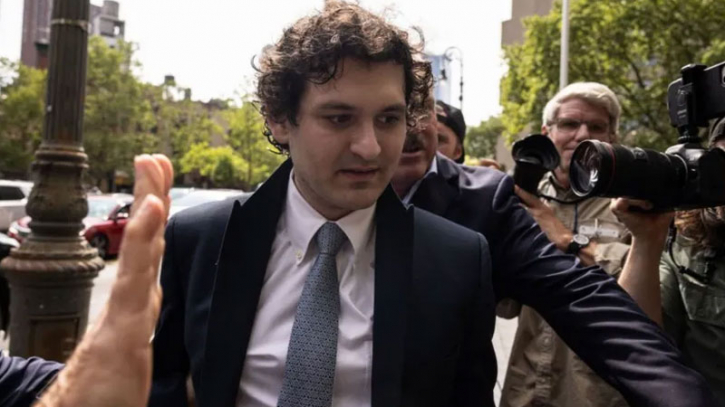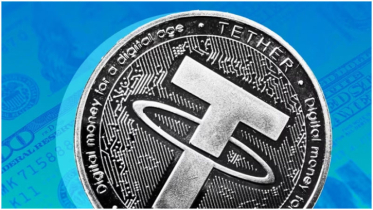Disgraced 'Crypto King' Sam Bankman-Fried to be sentenced

Former billionaire crypto boss Sam Bankman-Fried who was convicted of fraud and money laundering last year, will return to court in New York on Thursday to be sentenced for his crimes.
It is certain the 32-year-old will be going to jail; what is not known is how long for.
The moment has revived debate about the extent of his crimes - and what punishment might fit.
His legal team have called for leniency, but prosecutors are seeking 40 to 50 years in prison.
They say such a sentence is warranted for someone who lied to investors and banks, and stole billions in deposits from customers of his now-bankrupt crypto exchange, FTX.
His defence team has proposed five to 6.5 years, accusing the government of adopting "a medieval view of punishment" by insisting on a lengthy term behind bars for a non-violent, first-time criminal.
The question has generated hundreds of pages of letters from former FTX customers, family, friends of his parents - even complete strangers - trying to sway Judge Lewis Kaplan, the federal justice who will decide his fate.
"He has shown no remorse so why would any judge show any mercy?" said Sunil Kavuri, a British investor who had more than $2m worth of holdings on the exchange when it collapsed, and one of the people mobilising former customers to share their experience with the court.
FTX's collapse in 2022 was a stunning fall for Bankman-Fried, who had become a billionaire and business celebrity promoting the firm, a platform people could use to deposit and trade crypto.
It attracted millions of customers, before rumours of financial trouble sparked a run on deposits.
In November 2023, a US jury found Bankman-Fried had stolen billions in customer money from the exchange ahead of the collapse to buy property, make political donations and use for other investments.
Many of those customers now appear poised to recover significant sums, under a plan being developed in the separate bankruptcy case.
Under that proposal, former customers could receive money based on what their holdings were worth at the time the exchange collapsed.
In court filings, the defence for Bankman-Fried, who is expected to appeal his conviction, has argued that such recovery warrants a lighter sentence.
They said it proved that "money has always been available" which "would be impossible if [FTX's] assets had disappeared into Sam's personal pockets".
But the repayment plan has left many former customers outraged, since they will miss out on the crypto rebound that has occurred since.
John Ray, the lawyer leading FTX through bankruptcy and a critic of Bankman-Fried, noted the concerns in his own letter to court.
"Make no mistake; customers, non-governmental creditors, governmental creditors, and non-insider stockholders have suffered and continue to suffer," he wrote to the court, arguing that the claims of minimal loss were a sign that Bankman-Fried continued to live "a life of delusion".
Former FTX customers interviewed by the BBC said they were offended by the blithe dismissal of their problems, and urged the judge to reject calls for leniency.
"The people who are saying this are not in a position like I'm in, where you've lost everything," said Arush Sehgal, a 38-year-old tech entrepreneur living in Barcelona, who, with his wife, is one of the exchange's biggest individual creditors, with about $4m worth in savings in dollars and bitcoin at FTX when it collapsed.
He is one of the customers suing over the current bankruptcy plan, which he said amounted to a "second crime" against Bankman-Fried's customers.
Angela Chang, of Vancouver, a 36-year-old who worked in software, said she had about $250,000 deposited in dollars with FTX when it collapsed. She said she feared the harm done to FTX customers was being discounted because they were in the crypto industry.
"People think that crypto is criminal and so they have sympathy for this guy .... But I'm not a criminal," she said, describing how the fall of the firm threw her into depression and left her running up credit card debt. Facing a cash crunch, she ultimately sold a portion of a claim to an investor.
Columbia Law professor Daniel Richman said the scale of the crime was rarely as contested as in this case.
But he said decisions are often shaped more by other issues, including a judge's own impressions of the defendant, and what it would take to deter him from further crimes.
In this case, Judge Kaplan, a veteran of the court system who has presided over a slew of high profile trials involving public figures such as Donald Trump and actor Kevin Spacey, has already proven to be sceptical of Bankman-Fried's actions, revoking his bail last year after finding he was trying to intimidate other witnesses.
"Any judge or lawyer will tell you that one of the best things the defendant can do before being sentences is really really show he's on the right path, show some remorse and show some degree of self-knowledge as to his offence," Prof Richman said.
"Here you not only have a defendant who went to trial but you have one who really, at least the judge believed, was obstructive prior to trial," he said, adding that it would be "really surprising" for Judge Kaplan to render a sentence anything like the defence request.
Since the 1980s, the US has significantly increased the length of its official recommendations for jail time for white collar criminals.
Though judges frequently depart from the guidelines, introducing wide variability, "the risk of harshness is greater than in most countries" - particularly for high-profile cases, Prof Richman said.
In her own appeal to the judge, Barbara Fried, Bankman-Fried's mother and a former law professor, noted the "punitive nature" of the US justice system "which makes us an extreme outlier among democracies".
"I have no illusions about the redemptive power of prisons," she wrote. "Being consigned to prison for decades will destroy Sam as surely as would hanging him."
.png)




